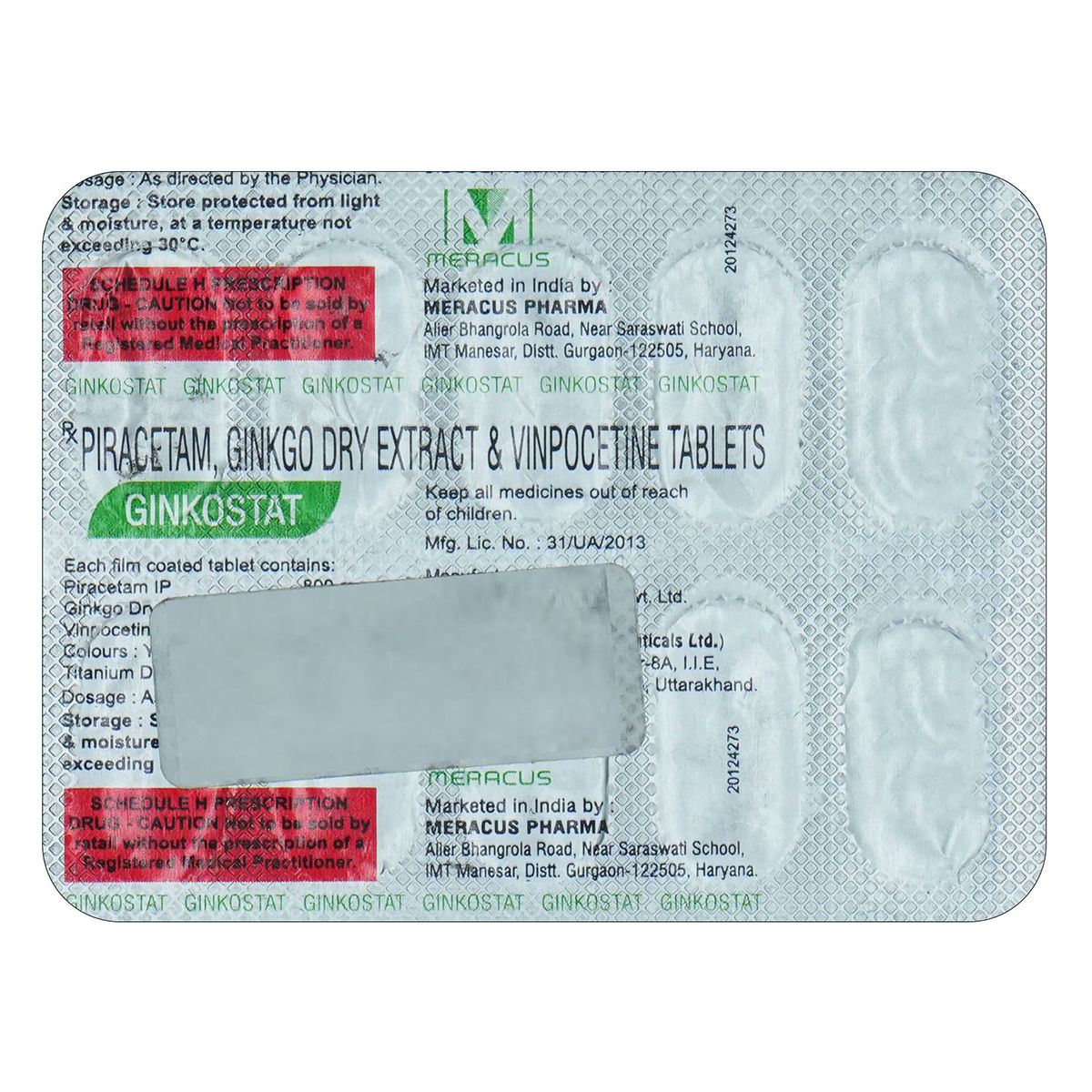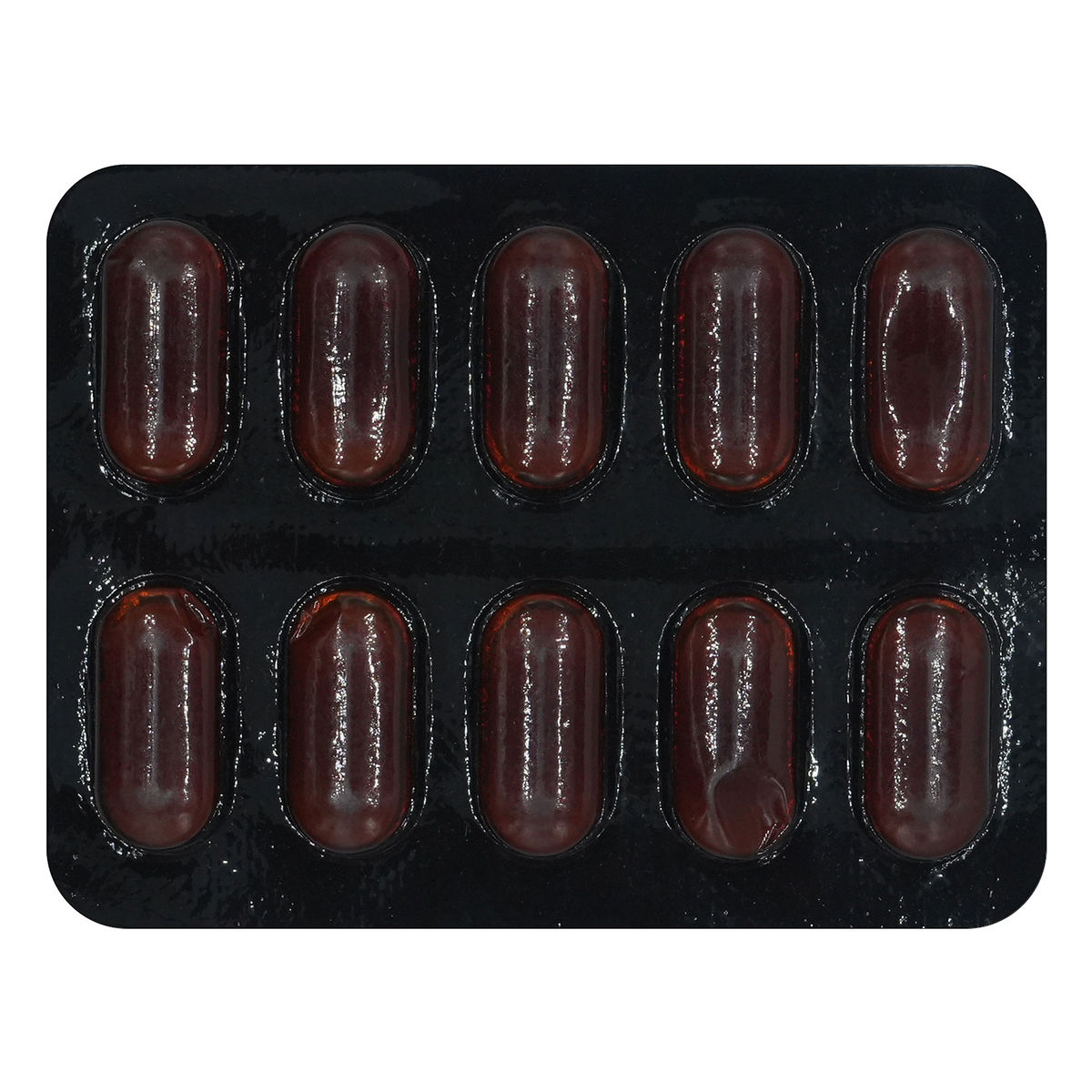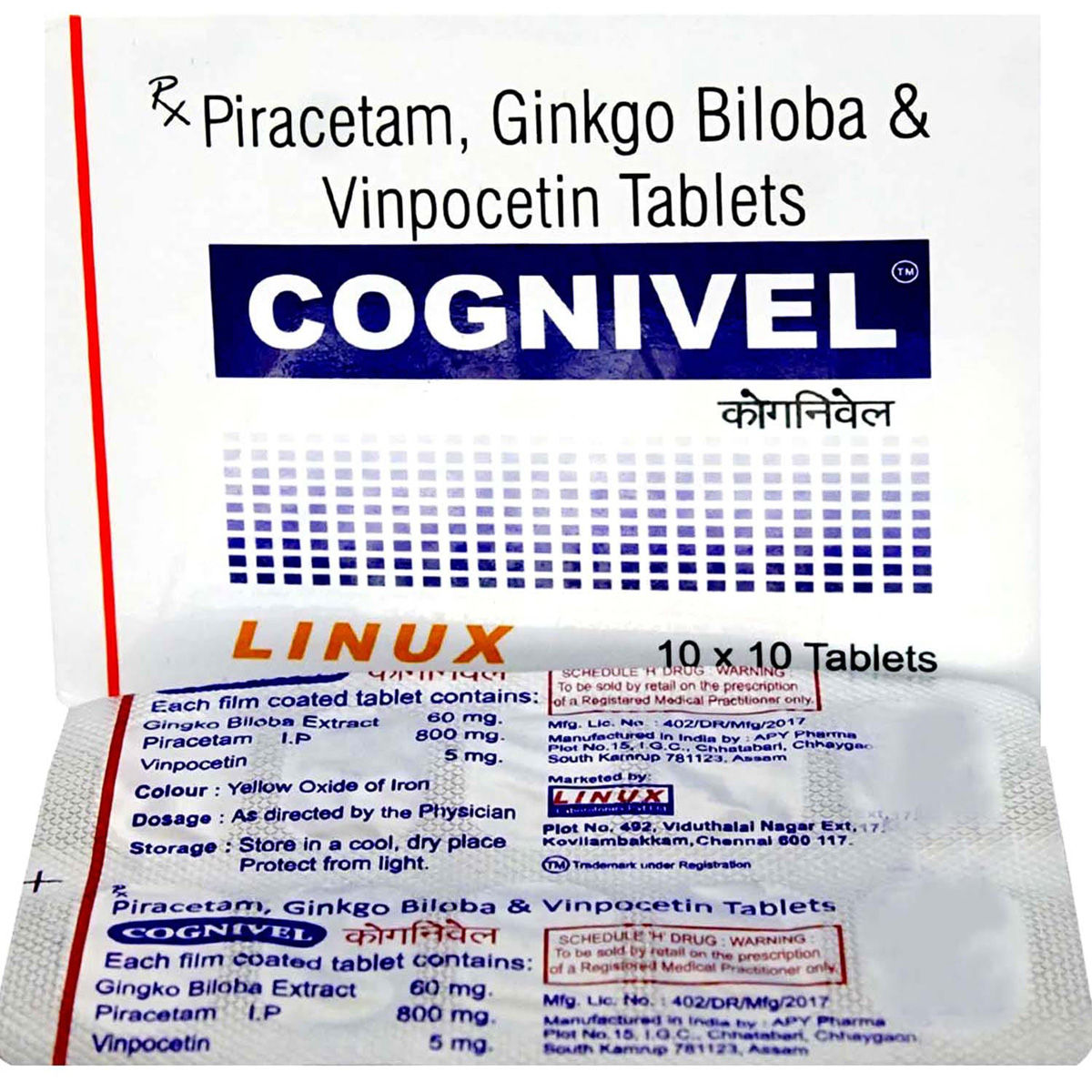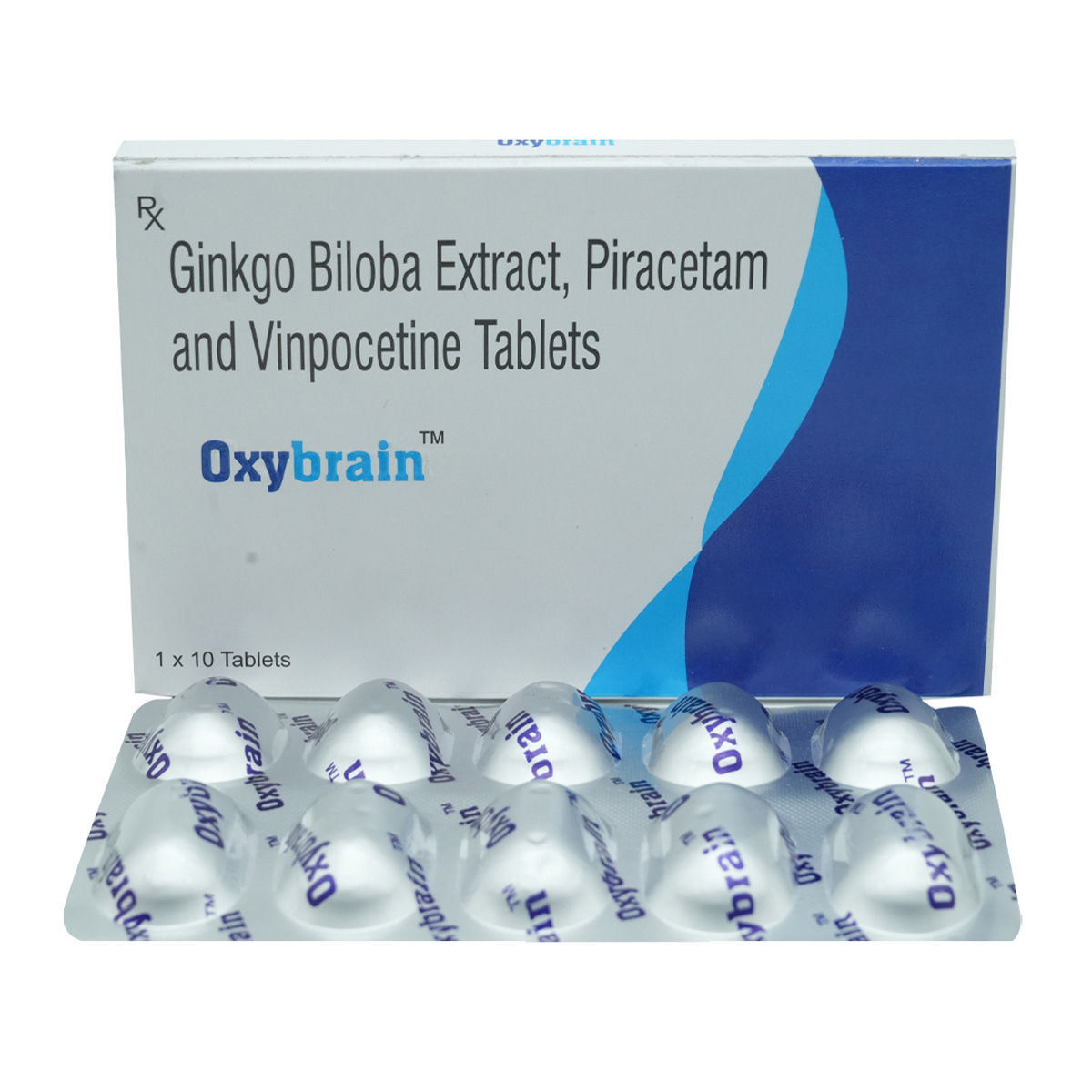Ginkostat Tablet 10's
₹243*
MRP ₹270
10% off
₹229.5*
MRP ₹270
15% CB
₹40.5 cashback(15%)
Free Delivery
With Circle membership
(Inclusive of all Taxes)
This offer price is valid on orders above ₹800. Apply coupon PHARMA10/PHARMA18 (excluding restricted items)
Know Your Delivery Time
Provide Delivery Location


Available Offers
 Prescription drug
Prescription drugWhats That

Secure Payment

India's Most Trusted Pharmacy

Genuine Products
Manufacturer/Marketer :
Consume Type :
Return Policy :
Expires on or after :
About Ginkostat Tablet
Ginkostat Tablet is used to boost brain performance or wakefulness, enhance mood, and improve cognitive ability in persons dealing with neurodegenerative diseases like dementia, Alzheimer’s disease and Parkinson's disease. Neurodegenerative diseases mean the death of neurons that can affect a person's speech, memory, intelligence, movement, and much more. Our brain is made of billions of neurons (cells in the brain) that communicate with each other to perform daily activities of the day. These neurons are closely connected, and even a small miscommunication in one area can affect brain activities, resulting in neurodegenerative diseases. In Alzheimer's disease, the brain cells degenerate and die, which causes a gradual decline in behavioural and social skills and thinking ability (dementia), which affects a person's ability to function independently. Parkinson’s disease is a central nervous system disorder affecting movement and locomotion. It causes stiffness, shaking, difficulty walking, coordination, and balance.
Ginkostat Tablet contains Ginkgo biloba, Piracetam, and Vinpocetine. Ginkgo biloba improves blood flow to the brain and acts as an antioxidant (natural substituent that slows down cell damage). Piracetam falls in the category of drugs called acetylcholinesterase inhibitors. This drug increases the levels of a substance (acetylcholine) in the brain, which is involved in improving memory functioning by slowing down the breakdown of acetylcholine (a substance that allows nerves to communicate and is important for normal brain functioning). Vinpocetine works like a neuroprotective agent that minimizes damage to the brain. It also prevents the risk of blood clotting in the brain, which makes brain cells (neurons) die. All three drugs, in combination, improve a person's mood, memory, and thinking ability.
Take Ginkostat Tablet as prescribed by your doctor. You should take Ginkostat Tablet as long as your doctor has prescribed it after checking your medical condition. The most common side effects of Ginkostat Tablet include flushing (sense of warmth in ears, neck, face, and trunk), weight gain, upset stomach, rash, nervousness, and abnormality of voluntary movements. This happens because the body is adjusting to the new medicine. If a person notices severe side effects of medicine or if side effects do not go away within a couple of days, then they need to consult with the doctor immediately.
Do not take Ginkostat Tablet if you are allergic to any of its components. If you have a heart rhythm disorder, a stomach ulcer, urination problems, asthma or other breathing disorders, seizure, or liver or kidney disease, inform your doctor before taking this medicine. Ginkostat Tablet is not recommended for use in pregnancy or breastfeeding. This medicine should be used with caution in elderly patients.
Uses of Ginkostat Tablet
Directions for Use
Medicinal Benefits
Ginkostat Tablet contains Ginkgo biloba, Piracetam, and Vinpocetine. Ginkgo biloba improves blood flow to the brain and acts as an antioxidant (natural substituent that slows down the damage to cells). Piracetam falls in the category of drugs called acetylcholinesterase inhibitors. This drug increases the levels of a substance (acetylcholine) in the brain, which is involved in improving memory functioning by slowing down the breakdown of acetylcholine (a substance that allows nerves to communicate and is important for normal brain functioning). Vinpocetine works like a neuroprotective agent that minimizes damage to the brain. It also prevents the risk of blood clotting in the brain, which makes brain cells (neurons) die. All three drugs, in combination, improve a person's mood, memory, and thinking ability.
How Ginkostat Tablet Works
Storage
Side Effects of Ginkostat Tablet
- Drowsiness
- Diarrhea
- Insomnia
- Weight gain
- Nervousness
What if I have taken an overdose of Ginkostat Tablet
Drug Warnings
The use of Ginkostat Tablet is not allowed in patients dealing with severe renal impairment, cerebral haemorrhage, and Huntington's Chorea. Additnitionaly, persons who are allergic to any of the components present in Ginkostat Tablet are not allowed to take Ginkostat Tablet . A person with a weak immune system or taking immunosuppressive medicine is not allowed to take Ginkostat Tablet as it may cause serious side effects. Tell your doctor about your medical condition and the medicines you are taking. Alzheimer’s disease may affect the ability to drive, so do not perform any activity that needs mental alert unless your doctor tells you it is safe. frequent use of Ginkostat Tablet may cause Behavioral sensitization, a process where a person does repeated behaviour, so talk to your doctor in such a case.
Diet & Lifestyle Advise
A person dealing with Alzheimer's disease needs to take proper nutrition to make their body strong and healthy. For a patient dealing with dementia, poor nutrition can affect behavioural symptoms and may cause weight loss.
Consume more whole grains, low-fat dairy products, vegetables, fruits, and lean protein foods, and reduce high saturated fat, refined sugars, and cholesterol from your diet.
Patients dealing with dementia should do meditation activities that help calm down their minds and make medicine work more efficiently.
Do physical exercises that are safe for Alzheimer's/ dementia patients. Avoid intake of high-protein foods like soy protein, fish, eggs, chicken, beef, and pork. Eat more whole-grain foods such as whole-wheat bread, oatmeal, brown rice, or pasta.
Eat more fibre-rich foods to ease constipation.
Drink plenty of water to avoid headaches due to dehydration.
Avoid the consumption of alcohol as it may increase drowsiness.
Habit Forming
Therapeutic Class
Ginkostat Tablet Substitute

Cognivel Tablet 10's
₹25.70per tabletPiratab Forte Tablet 10's
by AYUR
₹23.31per tabletCholinesave Tablet 10's
₹22.50per tabletTinzit Tablet 10's
₹29.25per tabletGinkocetin Tablet 10's
by AYUR
₹20.52per tablet
Product Substitutes
Alcohol
Unsafe
Avoid alcohol consumption while taking Ginkostat Tablet . Alcohol intake, along with Ginkostat Tablet , can worsen the symptoms of dementia.
Pregnancy
Caution
If you are pregnant, inform your doctor before taking Ginkostat Tablet . Your doctor prescribes this medicine only if the benefits outweigh the risks.
Breast Feeding
Unsafe
It is not known if Ginkostat Tablet passes into breast milk or not. If you are breastfeeding, please consult your doctor before taking Ginkostat Tablet .
Driving
Caution
Ginkostat Tablet can cause an undesirable reaction in the body that can impair a person's thinking ability. One should avoid driving and do activities that require mental alertness.
Liver
Caution
If you have liver problems, inform your doctor before taking Ginkostat Tablet . Your doctor may adjust the dose of this medicine or prescribe a suitable alternative based on your condition.
Kidney
Caution
Ginkostat Tablet can not be used in patients with severe renal disease. If you have kidney problems, inform your doctor before taking Ginkostat Tablet . Your doctor may adjust the dose of this medicine or prescribe a suitable alternative based on your condition.
Children
Unsafe
Ginkostat Tablet is not recommended for use in children as safety and efficiency were not been established.
FAQs
Country of origin
Manufacturer/Marketer address
Disclaimer
Author Details
We provide you with authentic, trustworthy and relevant information



















